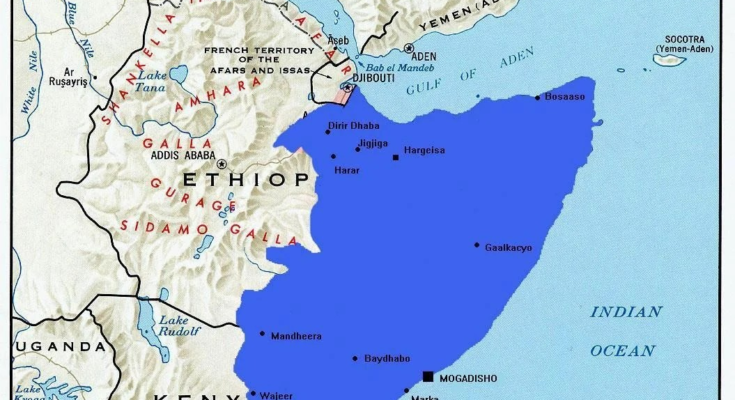For more than thirty years, Somalia has been and continues to be one of the most unstable countries on Earth. The country has not been able to achieve a sustained period of peace despite civil war and terrorism, political divisions, and foreign influence and meddling. Somalia is fragile despite repeated peace processes. Many Somalis are suffering from instability; however, many are also profiting, both in Somalia and internationally. So, who benefits from Somalia’s chaos and what is preventing stability in the country?
The Root Causes of Somalia’s Political Instability
Clans and Clan-Based Politics
The political culture in Somalia is largely clan based. Clans are a fundamental part of being Somali but have also caused conflict and instability. Political leaders have exploited the country’s clan divisions to retain power and have denied the possibility of a unified country. Electoral and governmental positions are often provided based on the individual’s clan affiliation rather than their merit and ability. Clan based dependence lead to instability, corruption, and political competition.
A Weak Central Government
The federal government in Mogadishu is not able to govern the entire country. Regional states such as Puntland and Jubaland have a significant degree of autonomy, and Somaliland has declared independence. The lack of a legitimate and authoritative central government has resulted in vacuums of governance and protection for organizations such as militia, terrorists, and warlords to succeed and thrive in Somalia.
Al-Shabaab and Terrorism
The Islamist militant group Al-Shabaab have fully exploited the instability in Somalia. Al-Shabaab takes advantage of weak governance and exerts territorial control across large rural parts of Somalia and invites violent attacks in urban centers. The group finances its terrorism through illegal taxation, extortion, and smuggling. Any steps toward stabilizing Somalia are mercilessly attacked by Al-Shabaab, as the group thrives on chaos.
Foreign Intervention
Several regional and international players have an interest in what happens in Somalia. Regional players like Ethiopia and Kenya, along with others like Turkey, the United Arab Emirates (UAE), Qatar, and some Western countries have been involved in supporting varying players in pursuit of their own interests. Some countries support players militarily while others exploit Somalia’s resources or geopolitical interests. In general, foreign involvement has incited older divides rather than stability.
Corruption and Mismanagement
This is another significant obstacle to rebuilding the Somali state. Political elites and officials regularly steal funds from the international community to support governance or cheat the government out of funds themselves. The failure to manage money causes essential services to remain underfunded and increases grievances. Moreover, poor accountability diminishes public trust in the government and creates fertile ground for extremists to gain support from citizens.
Who Benefits from Somalia’s Instability?
It is evident that many groups and individuals benefit from the violence and instability, and not directly from the violence is being experienced most acutely by the average Somali. Certain groups and Individuals make the highest profit from the ongoing crisis
1.Terrorist Group Al-Shabaab
This is the singular greatest beneficiary from Somalia’s instability. As long as the government system is divided and weak, the group can continue expanding its influence, collecting illegal taxes and illicit trafficking firearms and ammunition.
2.Foreign Powers
A number of foreign countries exploit Somalia’s volatile situation as a pretext to intervene militarily, to increase their economic engagement, or establish a military presence. For instance, Djibouti, as a neighboring country, hosts several foreign military bases based on instability in Somalia and the wider region. Foreign actors even back factions in the country that obstruct the creation of a united and stable government.
3.War Profiteers War
Conflict creates a very profitable business for arms dealers, warlords, and corrupt politicians. Smuggling of weapons, in particular, is rampant, and arms easily get into the hands of militias and terrorist organizations. Some Somali leaders are also profiting from international aid intended for developmental purposes, as they re-direct money for personal gain.
4.Regional Rivals
Some neighboring countries seek to keep Somalia weak, so that it does not develop into a strong competitor in trade and development influence. Political instability is also a reason for other outside players to intervene and continue their control over parts of Somalia’s economy and security arrangement.
Consequences of Instability
The ongoing instability in Somalia has wide-ranging impacts on the state and its surrounding region, including:
1.A humanitarian tragedy:
Millions of Somalis are now displaced, experiencing famine, poverty, and being deprived of health care and education.
2.An economic disaster:
Economic growth is undermined by continual insecurity, leading businesses to stagnate and investors to avoid the area, making the economy largely reliant on foreign assistance. 3)
3.Insecurity in the region:
Many effects of the instability in Somalia spillover into the immediate neighboring states, specifically Kenya and Ethiopia, which have become victims of cross-border attacks perpetrated by Al-Shabaab.
4.A political impasse:
Each initiative to construct a stable government encounter both internal and external opposition and leaves the state in a persistent state of conflict.
Will Somalia Ever achieve Stability?
There is a potential path, but Somalia faces numerous obstacles. The following are possible steps Somalia could use to create stability:
Build capacity in the Government Institutions – Somalia requires both capable and transparent government so that the state can unite and suppress clan-based politics.
Regional cooperation -Countries in the region must become advocates for peace in Somalia and not self-interested.
Anti-corruption – Good governance includes accountability to prevent international aid being used for the benefit of a few individuals; it must be allocated to the needs of the population.
Counter-terrorism – Al-Shabaab and its extremist structures require an allied military, economic and ideological approach over time.
Foreignization – Somalia needs to take the lead of its political and economic landscape; however, there will continue to be the need for assistance from the international community.
Conclusion
Somalia’s instability is not only an internal issue to be solved — it’s a deepening crisis, with local, regional and global players. As everyday citizens keep suffering, terrorist organizations, corrupt politicians, war profiteers and foreign powers profit from the turmoil. True peace will prevail when Somalia’s leadership puts national unity ahead of clan politics and when foreign actors cease to use the country’s instability for their own interests.
The real question though is; Does the world really want Somalia to be stable or is it just too profitable for it to be unstable?
What’s Your Take?
Let’s discuss! Let us know what you think in the comments. What do you think is the greatest obstacle to Somalia’s stability?




One more thing I would like to convey is that in place of trying to suit all your online degree tutorials on days of the week that you finish off work (as most people are worn out when they come home), try to get most of your instructional classes on the week-ends and only 1 or 2 courses on weekdays, even if it means taking some time off your saturday and sunday. This is really good because on the week-ends, you will be a lot more rested and concentrated on school work. Thanks alot : ) for the different ideas I have realized from your weblog.